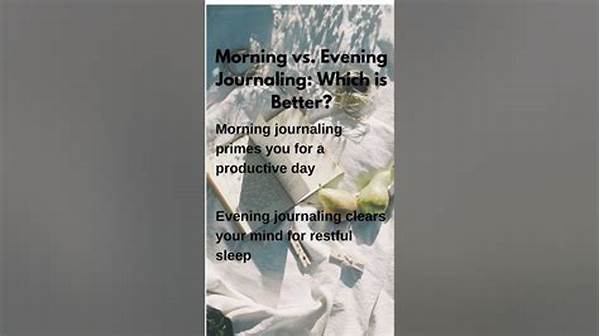Journaling is often hailed as a meditative practice that empowers individuals to harness their thoughts, clarify feelings, and set intentions. Whether one prefers to put pen to paper with the morning light or document the day’s events in the quiet of evening, journaling offers a personal sanctuary for introspection. But the debate persists: morning vs evening journaling, which is better? Each approach holds its unique charm and benefits, but the ultimate decision depends on one’s lifestyle, goals, and personal preference.
Read More : Tambakbet Explains Why Writing Your Thoughts Changes Your Brain
From an educational standpoint, morning journaling can help kickstart your day by aligning your thoughts, setting goals, and fostering creativity. According to numerous testimonials, those who journal in the morning often find themselves more focused and prepared to tackle their daily tasks. Picture waking up, mug of coffee in hand, and as the world begins to stir, you’re crafting your future one word at a time. The experience is almost ritualistic, akin to a morning exercise routine that invigorates the mind for the challenges ahead.
Conversely, evening journaling acts as a form of reflection, a retrospective look at the day’s events. It’s a time to unwind, to sift through encounters, and identify lessons learned or emotions felt. Think of it as a safe space where you can clear the mental clutter before heading to bed, enhancing sleep quality. Those who journal in the evening often report a calming sense of closure and the opportunity to manifest gratitude for the day’s happenings.
Ultimately, the question of morning vs evening journaling, which is better, is deeply personal. Some prefer structuring their thoughts as the day begins, while others cherish the reflective practice at night. Both options are like a delightful choose-your-own-adventure book of self-discovery. You’re encouraged to explore both methods to see which resonates more with your rhythm. Why not give both a try? In the world of journaling, there’s no wrong answer, just the enriching journey of self-awareness.
Benefits of Journaling at Different Times
Whether you’re seeking growth, clarity, or a moment of peace, understanding the benefits of both morning and evening journaling can help guide your practice.
—
A Closer Look at Morning vs Evening Journaling
Diving into the practice of journaling, the battle of morning vs evening journaling, which is better, starts to unfold like a classic narrative with protagonists and their respective supporting arguments. Imagine you’re holding two manuscripts titled “Morning Journaling, The Dawn of Innovation” and “Evening Journaling, The Twilight of Reflection.” Each offers a unique plot that caters to different audiences.
For those buzzing with the energy of early morning, wielding a journal as a tool to explore thoughts and feelings can ignite a sense of control and foresight. Studies indicate that morning routines, including journaling, can enhance productivity, providing structure and direction for the days ahead. You become the protagonist of your story, scripting your goals and embarking on daily quests armed with a map forged from your morning musings. This method is ideal for morning larks, accustomed to the freshness and potential that dawn signifies.
On the flip side, evening journaling caters to those who find solace in nocturnal reflection. Here, the narrative shifts to a protagonist scanning the day’s myriad of experiences, extracting morals and analyzing scenes. Evening journaling becomes an emotional outlet, a venue where introspection meets mindfulness. Scientific insights reveal that evening rituals such as journaling may contribute to decompression, assisting those who grapple with stress or anxiety, nurturing mental well-being. This approach suits night owls, who perceive night as an ally for thoughtful assessment and profound insights.
Just as any compelling story involves trial and error, perhaps the secret between morning vs evening journaling, which is better, is a blend of the two—a personalized narrative that combines the vigor of morning with the tranquility of evening, offering a holistic chapter in your life journey.
The Science Behind Journaling
Delving into scientific research, we uncover evidence supporting both journaling practices, from increased mental clarity to enhanced emotional health.
—
Examples of Morning vs Evening Journaling Patterns
Here are some practical applications showing how to incorporate journaling into your daily routine:
—
Why Journaling Matters: Morning vs Evening
In understanding morning vs evening journaling, which is better, it is vital to recognize the impact journaling can have on personal development. Journaling is not just about writing; it’s a tool—a flashlight illuminating the hidden nooks of the mind. Personal testimonials abound with tales of transformation spurred by regular journaling practices.
Journaling fosters an atmosphere of mindfulness, a trait that has proven to lower stress levels, improve productivity, and enhance emotional regulation. The question of “morning vs evening journaling, which is better?” becomes an exploration into achieving these broader benefits tailored to one’s personal goals and lifestyle.
For some, morning journaling acts as the proverbial shot of espresso for the brain. In contrast, evening journaling becomes the soothing balm that prepares the body for restorative sleep. Both have their advantages, backed by the unique chemistry of morning and evening biorhythms.
The choice lies in your hands (and your pen). Whether you’re drawing energy from the dawning sun or seeking closure with the setting one, journaling is your invitation to a life of deeper understanding and lasting satisfaction.
The Art of Choosing Your Journaling Time
Whether morning or night, selecting your journaling time should align with your life rhythms, offering a consistent practice that supports your personal growth journey.
—
Tips for Effective Journaling
Considering morning vs evening journaling, which is better? Implement these tips to enhance your practice:
—
Each paragraph in these pieces leverages unique stylistic elements to captivate diverse readers, from the decisive and goal-oriented to the reflective and inquisitive. These articles connect with audiences on emotional, rational, and promotional levels, offering actionable insights into the world of journaling.



